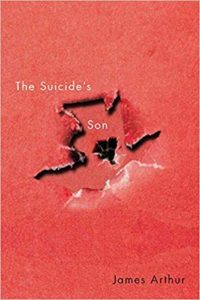 Last night I had the pleasure of reading with James Arthur at BookBar in Denver, Colorado. (Thanks to all who attended!) We had never met, so I was excited to hear his poetry. He read from The Suicide’s Son, a collection so well-crafted, with a sweet lilt of humor here and there, that couldn’t wait to get home to read it. This slim volume is impressive. I’ll share some thoughts on my favorite poems so you will run out and grab a copy for yourself.
Last night I had the pleasure of reading with James Arthur at BookBar in Denver, Colorado. (Thanks to all who attended!) We had never met, so I was excited to hear his poetry. He read from The Suicide’s Son, a collection so well-crafted, with a sweet lilt of humor here and there, that couldn’t wait to get home to read it. This slim volume is impressive. I’ll share some thoughts on my favorite poems so you will run out and grab a copy for yourself.
First, let me say that any book with a poem titled “Ode to an Encyclopedia” is going to win me over. I have my own fond memories of The World Book Encyclopedia, which my father bought for us kids from a door-to-door salesman, perhaps the most important contribution he made to our education before he died too young. I used that reference for every school report I ever wrote. Arthur’s poem starts with his own parents’ encyclopedia, and by the time you get to the diagram/ of a cow broken down into the major cuts of beef, you (like me) will feel sorry for every kid who grew up with the internet.
Arthur started the reading with “School for Boys,” which starts with this arresting first line: I believe in the power of original sin/ of the wound/ that keeps on wounding. Right there I was taken in—and impressed that he was reciting from memory. In fact, he did the entire reading from memory, which stunned all of us, and he never stumbled over a single syllable. I began to suspect we were in the presence of a master. I don’t want to give away the rest of that stanza because I want you to read the book, but the second stanza was just as gripping: I’ve forgiven the teenage pedophile/ who lived a few doors down/ when I was seven. Look, you don’t just throw these lines out unless you are willing to commit, and the rest of the poem barrels on:
The anger, the shame:
over time, these things just become
a piece of who you are.
You build around them, since you can’t
burn them down.
So far I’ve learned a lot from reading James Arthur and two of those things are: 1) Rip open each new stanza so your reader can’t walk away, and 2) take your time, but follow through. The poem didn’t end in any way I expected, but I’m pretty sure it ended exactly as it should have.
As he read on, we wandered through children’s books and his take on them as a father, drizzled with humor. “Children’s Book” tackles (literally) Eric Carle’s The Very Quiet Cricket. In “Hundred Acre Wood” I was tickled by a line you wouldn’t expect to find in a poem about Winnie the Pooh: I like reading to rooms of strangers, and a few drinks at the airport/ while I’m waiting for my plane. In the book you find another poem along this theme: “Goodnight Moon” has some of the same haunting qualities of the classic many of us question, as well as a reference to abortion. In the hands of this craftsman, it works; sort of like the way that bowl of cornmeal mush leaves us a bit queasy but there it is. What are you going to do?
The poem “Wind” personifies the same, with this tiny epiphany: I’m nothing/ until I happen. Of course it’s true, but I would have never thought of it until someone wrote it, and that is why we need poets.
My other favorite poems in the book include “Fixer Upper.” It teaches something I have an instinct for myself: If you are going to write about domestic scenes, you best have a startling image or revelation to end with. Arthur’s ending will likely be lodged in my brain for some time. Same with “Tree Planting.” The narrative details bring you through a world you may have never seen but can easily imagine as it’s presented to you. As you read, though, you may not hear the haunting strains of music beginning to rise but the cinematic tension builds until you almost wince. Then, drawing from tools of cinema itself, the poet does something you’d not expect and the poem remains unresolved in a brilliant way. You have to read it to believe it.
Another thing I learned by reading Arthur was less obvious while listening to him: You can pull your reader along like a piece of yarn woven through a sweater, gathering their attention. We all wanted to know how he managed to memorize so many poems. “I listen for the internal rhymes,” he said. I did notice a rhyme here and there, but his delivery was so smooth, he never hit them hard, which would have detracted from the imagery. Oddly enough, while reading his poems in your head you will hear those internal rhymes more clearly, but they will only serve to move you along, not distract you. Masterful indeed.
The Suicide’s Son by James Arthur. 2019, Véhicule Press. 77 pages, paperback. On Amazon here: https://amzn.to/2kyMqYN.
From James Arthur’s bio: James Arthur’s first book was Charms Against Lightning (2012). His poems have appeared in the New Yorker, New York Review of Books, London Review of Books, Poetry, and The Walrus. Arthur grew up in Toronto and now lives in Baltimore, where he teaches in the Writing Seminars at Johns Hopkins University.


I love your website! I met you last Saturday at the Columbine Poet’s Fest. We didn’t actually visit, but I was so impressed with your critiques of the poems you judged. I won first place with “Blood Bond” in the free verse category.
Currently, I am trying to assemble a collection of my poems. If you have the interest and the time (aside from teaching and writing and…) I would like someone to help me with my project. Contact me by email, and we can discuss the particulars. Best wishes, Doris